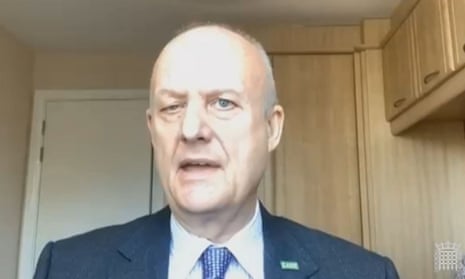Ministers have deepened the split between social care and the health service since the pandemic began, the chief executive of trade group Care England has said.
In a devastating attack on the government, Professor Martin Green said that ministers tested out controversial policies on social care and treated it “like the child they are irritated with” while the NHS was “the favoured child”.
Green, head of England’s largest care body, representing 3,800 homes and more than 50,000 residents, said policies introduced during the pandemic had “fragmented the two systems”.
Ministers are reportedly planning to introduce mandatory vaccinations for NHS staff next April, after first introducing the policy for social care. From Thursday, all staff working in care homes need to be fully vaccinated.
“If they introduced it when they introduced it for us, there would have been lots of staff in the NHS leaving,” Green said. “And that would then cause a problem for the NHS over winter. But they’re quite happy to cause a problem for us over winter. But of course, because the accountability trail goes back to the secretary of state’s desk, they don’t want it to be happening in the NHS.
“Throughout this pandemic, the government has not understood the essential role social care has. We saw at the start of the pandemic that the entire focus was on an organisation, the NHS, rather than thinking about where the most vulnerable people were, which was in social care.”
Green listed other ways that the system had become more fragmented: paying NHS trusts, but not care providers, up to £7,000 to help recruit nurses from overseas; asking care homes and their staff to pay more national insurance to fund the NHS without any financial support; and capping the cost of agency nurses for the NHS but not for social care.
“If you look at what they’ve done, everything that causes a problem, they do it in social care first,” Green said. “Anything that enables more resources to flow, they do to the NHS. And they have never understood the link between the two systems. They treat one as the favoured child and the other as the child they are irritated with.”
Many within the NHS, including its former chief executive Sir Simon Stevens, have pleaded with the government to fund care properly, so that people do not stay too long in hospital and do not need to return quickly because of a lack of care and support.
Green said mandatory vaccinations were causing a “very big problem” for social care providers, which is in the midst of a workforce crisis with 160,000 vacancies. A total of 492 older adult care homes have more than one in five staff who have had no Covid vaccinations at all, according to the latest NHS figures.
When the decision to make it mandatory for care staff to be fully vaccinated came into effect on 22 July, there were 470,712 staff working in older adult care homes. Only 412,815 have had a second dose by 31 October, and the total number of staff has dropped by nearly 9,000.
The Care Quality Commission has said that it will implement the mandatory vaccination policy “fairly and proportionately”, and if it was made aware that some staff were refusing vaccinations, it would assess each situation individually.
On Sunday Care England publishes its response to the government’s plans for social care, which include what it calls a “health and social care levy” (a 1.25% increase in National Insurance contributions) introduced next April.
“None of that is going to social care – it’s all going to the NHS,” Green said. “Millions are being taken out of care providers’ pockets and the pockets of the people who actually work in social care because of the levy.”
The increase in the minimum wage which providers will pay staff was not being accompanied by an increase in money paid by local authorities for care packages, he added.
LaingBuisson, which provides independent sector healthcare market data to the Office for National Statistics, estimates that a nursing care home needs to charge up to £1,075 per week to generate a sustainable return, but average fees paid by local authorities and funded by Whitehall were £764 per week in 2020-21.
“We want to increase salaries,” Green said. “But providers are getting less than £5 an hour to pay for 24-hour residential care, with three meals a day and activities. There’s no bandwidth to increase salaries.”
The government plans also include a cap of £86,000 on personal care costs from October 2023, although accommodation costs will not be covered. An adult social care reform white paper is due to be published this year.
“We appreciate the dedication and tireless work of health and social care staff throughout the pandemic,” said the Department of Health and Social Care. “We have provided record levels of investment to support them and we are providing another £36bn in health and care over the next three years – including £5.4bn for social care – which will allow us to begin a comprehensive programme of reform for the care sector.”
